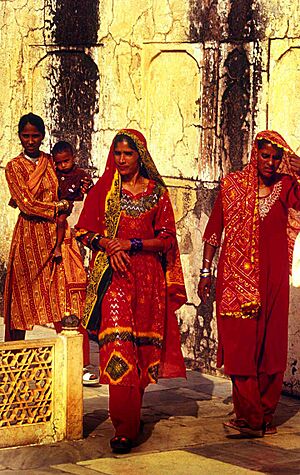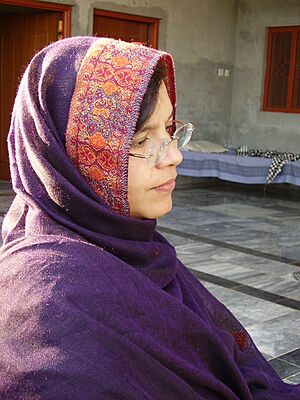Dupatta facts for kids
A dupatta (also called chunri or chunni) is a long scarf that is an important part of many women's outfits in South Asia. You'll often see it worn with outfits like the salwar kameez, a trouser suit, or a kurta. It's also worn with traditional outfits like the lehenga or ghaghra-choli. For a long time, the dupatta has been a symbol of modesty in South Asian clothing.
Traditionally, it's worn draped over both shoulders. However, the dupatta can also be worn like a cape around the whole body. Dupattas are made from many different materials, like cotton, georgette, silk, and chiffon.
What is a Dupatta?
A dupatta is a long piece of fabric, like a scarf, that is a key part of many traditional outfits for women in countries like India, Pakistan, and Bangladesh. It adds beauty and style to the clothing. It can also be used to cover the head or shoulders.
How is it Worn?
There are many ways to wear a dupatta. When it's not draped over the head in the traditional way, it's often worn with the middle part resting on the chest, like a necklace. Both ends are then thrown over each shoulder. When worn with a salwar-kameez, it's often allowed to flow freely down the front and back.
Dupatta in Fashion
Over time, the way people wear the dupatta has changed a lot. In today's fashion, you often see the dupatta draped over just one shoulder, or even just over the arms. Another new trend is the shorter dupatta, which is often worn with kurtas and modern Indo-Western clothes.
Today, the dupatta is often used as a fashion accessory in cities. But even with these new styles, the dupatta is still a very important part of Indian and Pakistani clothing. It's a mix of modern fashion and traditional culture.
Images for kids
-
Sanchi Stupa relief: women with dupatta on balconies watching men fighting for Buddha relics
-
A Punjabi Sikh woman with blue chunni.
-
A dupatta shop in Dhaka, Bangladesh.
-
A Sikh in a salwar kameez
 | George Robert Carruthers |
 | Patricia Bath |
 | Jan Ernst Matzeliger |
 | Alexander Miles |













